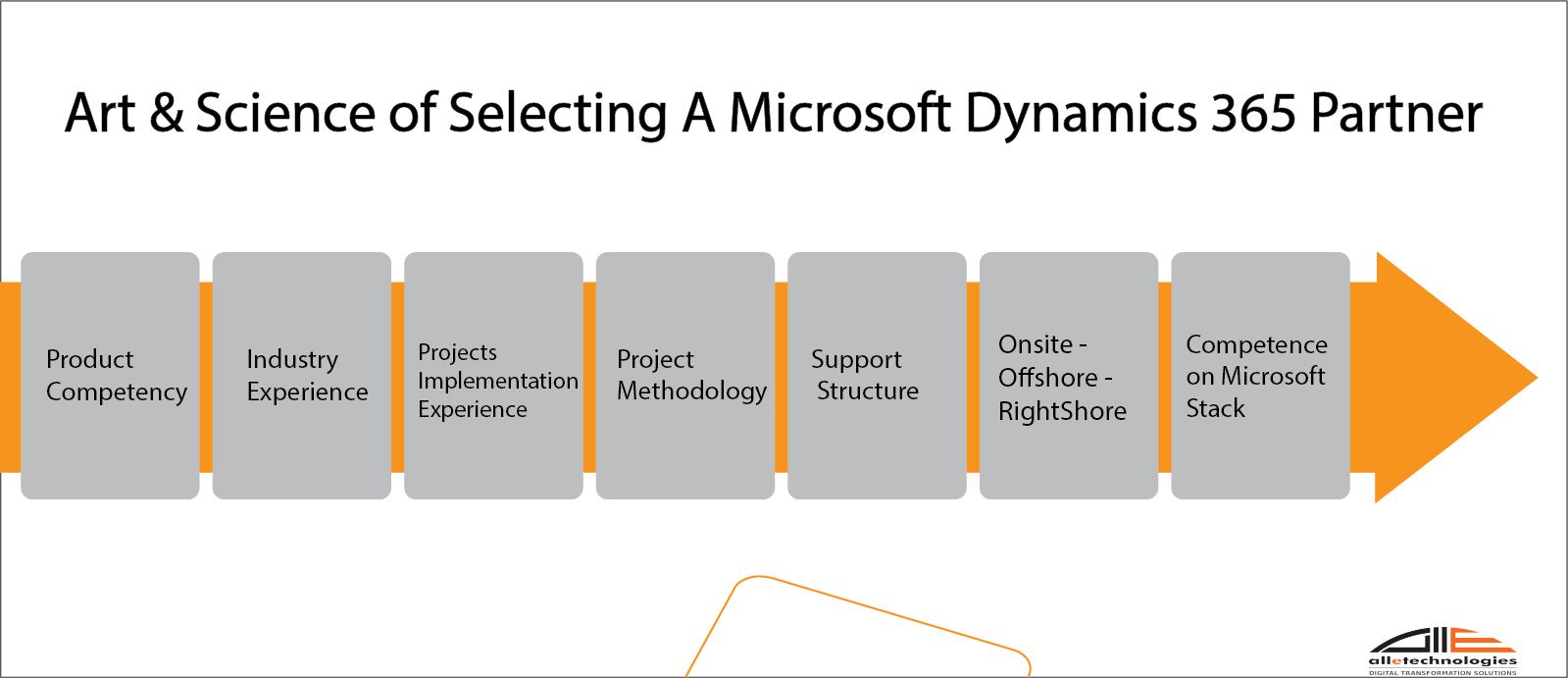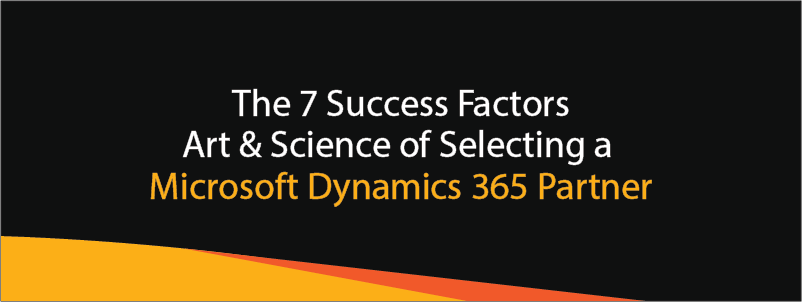Selection of the ‘right’ Microsoft Dynamics 365 Implementation Partner is both an art & science. While Microsoft segments partners in 3 categories – Gold competency, Silver competency, and Member, this segmentation is influenced by the number and size of deals annually these partners have successfully clinched. If you have already decided on Microsoft Dynamics 365, and are looking for a partner who gives you the best chances to succeed with the project, here are the factors you should evaluate:

1. Product Competency
Several Microsoft Dynamics partners are specialized only on a certain product, or on a small subset of products. For example, there are partners specializing in only CRM, and some others specializing in only ERP. With the growth in the product offerings, a significant percentage of partners might be further sub-specialized to specific components of CRM or ERP. Under the broad category of CRM are specific products for – Sales, Marketing, Customer Service, Field Service, PSA etc. Not every CRM partner is e.g. skilled and experienced with PSA and Field Service.
Similarly, on the ERP side, there are multiple products and components. There are partners focused only on small and mid-sized businesses, specializing in D365 Business Central, and there are partners specializing in D365 Finance and D365 SCM. Ensuring that your partner has sufficient staff strength specializing in the products you are going to implement should be an important selection criteria. At least some key people of the partners team should also be Microsoft certified on those products.
2. Industry Experience
While businesses in general are about Sales | Purchase | Financial Accounting | Manufacturing | Distribution – every industry segment has its own uniqueness, which becomes critical to address for a Business Application to succeed. Knowledge of these ‘domain’ specifics play a vital role in the success of a project. Mature Dynamics partners would have specialized on a set of industries, and even built industry specific add-on solutions. Assessing a partner’s competence on your industry should be an important factor in your decision making process.
3. Project Implementation Experience
Just as the number of ‘flying hours logged’ is a vital measure of a pilot’s competence, the number of implementation projects executed is a measure of a partner organization’s competence. Try to assess the size and complexity of projects undertaken by your partner. Every project brings a new experience. If your business is multi-country – a partner having the experience of building global templates, working with multi-country localizations, and doing multi-country rollouts will be very advantageous. Everyone makes mistakes, but important is – if they are learning, and becoming more efficient. It’s always a good idea to do some reference checks.
4. Project Methodology
Discuss with your partner in detail the project methodology they are going to adopt. It’s very easy to have a superficial conversation about project methodology, but the devil is in details. Ask your partner to explain to you various stages of the methodology in detail. Ask for all the templates and process documents to be used. Ask for samples from previous project artefacts.
Most Dynamics partners use Waterfall methodology, but some front running partners would have transitioned to Agile, or Hybrid-Agile. Understand in detail what they will do when, and what role will the business users have to play, at what stage.
5. Support Structure
Post go-live support is vital for every enterprise application. Most ERP & CRM solutions require ongoing support for – enhancements, bug-fixing, user training, etc. Understand the processes and tools your partner is going to use for providing you with ongoing support. Many partners may not have a ticketing tool, or might have only limited hours support. Assess your needs, and then assess if your partner is equipped to meet those needs. If you require multi-country support, then you need the partner to provide support across time zones.
6. Onsite – OffShore – Rightshore
A partner’s ability to leverage onsite & offshore can make a significant difference to your overall project success. Offshore delivery capabilities result in overall better project pricing, faster availability of resources, and sometimes even shorter delivery timelines. This model brings to you scalability, giving you more mileage from the dollars invested. With ‘onsite’ model having been significantly impacted by the COVID situation, most project work is anyway happening remotely. Hence judge your partner’s maturity of technology and processes to work remotely, and leverage the better pricing models of offshore/ right shore project execution.
7. Competence on Microsoft Stack
The technology and product landscape have transformed dramatically in the last few years. Businesses need to go beyond the traditional borders of ERP & CRM, and use diverse technologies ranging from Analytics to AI. Products don’t work in isolation, or in a boxed on-prem environment. The most impactful Dynamics 365 implementations work together with Power BI, Power Apps, Automate, AI Builder, SharePoint and possibly a host of other point solutions to deliver business benefits to their customers, and help them through digital transformation. It’s therefore important for you to assess the competence of your Dynamics partner to take you through this journey successfully.
With the experience of having helped over 700 customers, from 30+ countries, succeed with their business applications over the past 2 decades, Alletec is amongst the largest and the most prominent Microsoft Dynamics 365 Partners from India. Alletec has built industry solutions for Travel, eCommerce, EPC, Engineer-to-order, Specialty Chemicals, Channel Management, banking & non-banking financial institutions. We have built a Hybrid-Agile methodology for our implementation projects, and provide 24×7 helpdesk support to some customers having multi-country operations.
Alletec brings competence across the Dynamics product line – D365 Finance, D365 SCM, D365 Business Central, D365 Customer Engagement, D365 Project Operations, D365 Field Service, and other components of the D365 suite. The strong competence on the Power Platform, Azure Cognitive Services, and Data & AI solutions is enabling us to modernize the business applications for our customers.
Alletec has proven success with offshore project executions. More than 150 customers from US, Canada, Europe, Africa, APAC, and the Middle East have leveraged Alletec’s offshore model for their project success.



Comments (0)